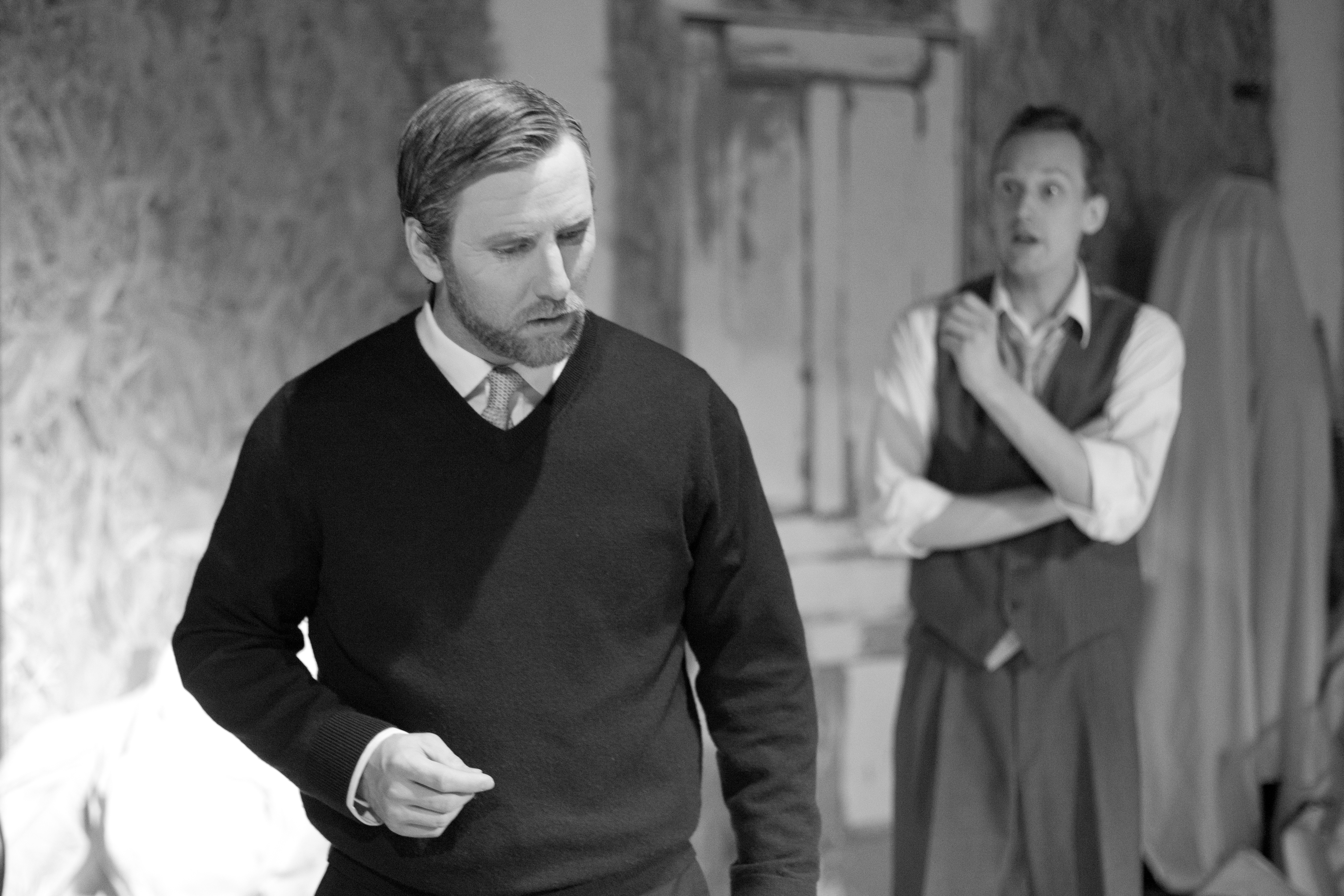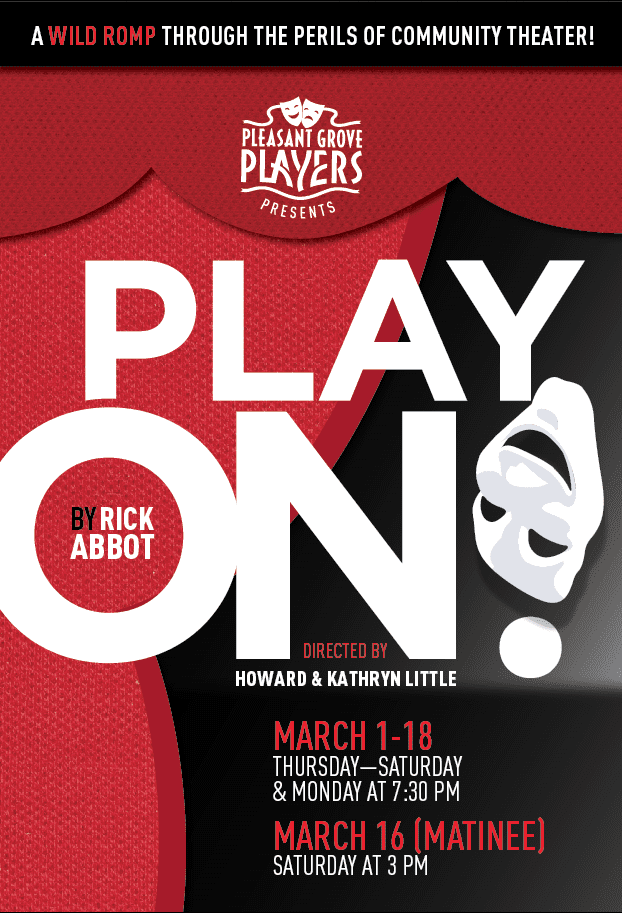PROVO — Bielzy and Gottfried is one of the first entries in what the Echo Theater is calling its Playwriting Showcase. Unfortunately, this entry featured a poor script and an unpolished production that lost sight of the goal of making the audience really think.
The show is structured using a series of short plays that are all tied together (and sometimes influenced by) the over-arching story of Lucius Bielzy and Joshua Gottfried; two play producers who were symbolic of the Devil and God. In the prologue, they reach an agreement to show a set of plays to an “unbiased” audience, but pointing out that they would not tell us which plays had been chosen by which producer.
The show was mainly hampered by J. Omar Hansen’s script, which felt unpolished and didactic. The purpose of the show, as stated by Bielzy and Gottfried themselves, was to have the audience re-examine their ideas of “morality.” It was done with the intent to reference the morality plays of medieval Europe. Yet the play had too few parallels to the classic style to consider it a historical endeavor, and there was so much heavy-handedness in the “teaching” that it prevented any real introspection from taking place. For the most part, the characters lacked depth and were not written in a way that allowed me to connect with them. Most of the dialogue sounded like the characters were being used to preach to the audience.
But the most confusing aspect of the script can be summed up by one of my most frequent notes of the evening: “What is the purpose?” We were told numerous times by Bielzy and Gottfried that the audience should be examining and thinking and judging, but the short plays that were presented didn’t really give much to examine or apply. There was no balance in the arguments, there was no reference point for an average audience member to connect with. I only cheered for Eve/Pandora because she was written so much more convincingly than Adam. I didn’t care that the fake Joseph McCarthy got called out because I wasn’t ever invested in him. I didn’t feel for Job because everything just kind of happened all at once, but the events in Job’s story were still presented as if they were realistic. It was as if each small play would build up a caricature of what “evil” or “bad” or “good” was, and then, to seem balanced and to make the audience “question our idea of morality,” would tear down that caricature. But there was no questioning because the caricature wasn’t relatable in the first place.
Oh, and it was a musical. Well, kind of. It was a “folk musical.” Meaning that there they used a guitar (KC Ushijima) and a piano (Michael Bascom) to sing a song every now and again. But the songs didn’t seem to fit, and they definitely didn’t add to the show. They lyrics were usually forgettable (“The box, the box, a pox on the box.”) or were drowned out by the instruments on stage. Often times the cast members weren’t sure which verse they were supposed sing. It seemed in a way like the music was an afterthought. Though to give credit where it is due, I’m not sure that I’ve ever heard a song before that recounted the actions of Joseph McCarthy in the 1950’s communist scare.
The acting, for the most part, needed some work. It was often difficult to understand the actors due to poor diction. There were also numerous missed lines, and the singing was frequently off-key. There were also a number of scenes that contained little emotion and the lines sounded rehearsed. This drew more attention to the fact that the lines themselves were poorly written.
There were, however, a few notable exceptions. Lori Hansen as Sister Prescott did exceptionally well in The Sermon. She had an energy that helped her control the stage marvelously in what was essentially a one woman show. I could see her character coming up with ideas, changing, losing control, checking the extras on stage, and so on. Hansen had a great stage presence that brought a new life to a struggling show. Nicolas Brady also had a natural delivery and was committed to his role of Job. He was also very comfortable on stage and handled some missed sound cues rather well. Brady also transitioned well from confusion to grief to pain to anger to peace quite well. It was unfortunate that the majority of his lines seemed to consist of “Why are you doing this?” and “I think I’m going to throw up.” Finally, Tyrell Clement and Trevor Newsome did fairly well as Bielzy and Gottfried respectively. Though there were flubs here and there, they were able to play off each other relatively well thanks to their professional chemistry. I could sense that there was a relationship between the two characters, and it became interesting to see the give and take between the two actors.
The directing was done by a team of directors (Georgia Buchert, Jacob Lees Johnson, Ronnie Stringfellow, Daniel Riggs, and Zachary Vineyard). Each director was in charge of one of the short plays, with Buchert handling all of the transitional scenes. For the most part the directing worked for the production, though many of the scenes consisted of the characters mostly standing and talking to each other, or turning to talk to the audience.
Because the Echo is a relatively new, relatively small theater group, they haven’t invested a lot in the technical elements of the theater. Sets usually seem to get priority. This one, designed by Josh Whitehead, was simple but effective for the tone of the play: two circus style entry ways, a desk, a box, and some chairs. The circus-style posters were also a nice touch, but unfortunately all five of them had problems on opening night. Lights (David Thorpe) were also fairly simple, though some of the changes didn’t make sense, such as trying to divide the opening with Bielzy and Gottfried into a separate room, only to bring lights full a few seconds later. The final scene, The Visit (directed by Zachary Vineyard), had a really neat backlighting effect, though it did make facial expressions difficult to see because the characters were silhouetted for the whole scene. Unfortunately, the lights and sound were plagued with missed cues.
So in the end I walked away from Bielzy and Gottfried with a lot of questions, not about the nature of morality as the show intended, but about the play itself. I was utterly baffled by so many of the decisions made in the script. I was told (by the characters) that it was a thought-provoking evening, and I guess in a way that’s true. But I still have no idea what the show was arguing. Even Joseph McCarthy had his faults? If the Devil asks you to pick up the phone, don’t? Maybe these are just Meatball Criticisms, but there really wasn’t much else there. It felt like this production was trying so hard to make me think, but so many of the ideas seemed to only be half-developed, never coming to any semblance of a point. “Full of sound and fury. Signifying nothing.” I think the character of Job had a line that sums up my experience perfectly: “I don’t understand what’s going on. I just wanted to go to the theater.”






